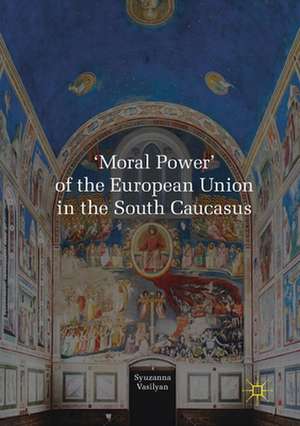'Moral Power' of the European Union in the South Caucasus
Autor Syuzanna Vasilyanen Limba Engleză Paperback – 14 aug 2020
| Toate formatele și edițiile | Preț | Express |
|---|---|---|
| Paperback (1) | 585.73 lei 6-8 săpt. | |
| Palgrave Macmillan UK – 14 aug 2020 | 585.73 lei 6-8 săpt. | |
| Hardback (1) | 732.21 lei 6-8 săpt. | |
| Palgrave Macmillan UK – 4 iul 2019 | 732.21 lei 6-8 săpt. |
Preț: 585.73 lei
Preț vechi: 689.09 lei
-15% Nou
Puncte Express: 879
Preț estimativ în valută:
112.10€ • 116.72$ • 94.74£
112.10€ • 116.72$ • 94.74£
Carte tipărită la comandă
Livrare economică 07-21 martie
Preluare comenzi: 021 569.72.76
Specificații
ISBN-13: 9781349929146
ISBN-10: 134992914X
Pagini: 331
Ilustrații: XXI, 331 p. 2 illus., 1 illus. in color.
Dimensiuni: 148 x 210 mm
Greutate: 0.47 kg
Ediția:1st ed. 2020
Editura: Palgrave Macmillan UK
Colecția Palgrave Macmillan
Locul publicării:London, United Kingdom
ISBN-10: 134992914X
Pagini: 331
Ilustrații: XXI, 331 p. 2 illus., 1 illus. in color.
Dimensiuni: 148 x 210 mm
Greutate: 0.47 kg
Ediția:1st ed. 2020
Editura: Palgrave Macmillan UK
Colecția Palgrave Macmillan
Locul publicării:London, United Kingdom
Cuprins
Chapter 1. Introduction.- Chapter 2. The Conceptual Framework “Moral Power”.- Chapter 3. The European Union (EU) as a “Moral Power” through the European Neighborhood Policy (ENP)?.- Chapter 4. The European Union (EU) as a “Moral Power” through Regionalization of the South Caucasus?.- Chapter 5. The European Union (EU) as a “Moral Power” through its Security Policy in the South Caucasus?.- Chapter 6. The European Union (EU) as a “Moral Power” through its Conflict Resolution Policy in the South Caucasus?.- Chapter 7. The EU as a “Moral Power” through its Democracy-Promotion Policy in the South Caucasus?.- Chapter 8. Conclusion.
Notă biografică
Syuzanna Vasilyan is Research Fellow at the Universite Libre de Bruxelles, Belgium (since 2015) and Visiting Professor at Sciences Po Paris, France (2016). She was Assistant Professor and Jean Monnet Chair of European Studies at the American University of Armenia (2011-2015), Visiting Professor at Central European University, Hungary (2010-2011), and Visiting Researcher at the European University Institute, Italy (2009-2010, 2013, 2015, 2016).
Textul de pe ultima copertă
This book devises a new conceptual framework of ‘moral power’ and applies it to the policy of the European Union (EU) towards the South Caucasian states of Armenia, Azerbaijan and Georgia. It covers the period starting from the 1990s to the present and analyses policy domains (democracy promotion, conflict resolution, security, energy, trade) juxtaposing the policy of EU/member states with those of the United States (US), Russia, Turkey, Iran, as well as inter-governmental and regional organizations. ‘Morality’ is unpacked as composed of seven parameters: consequentialism; coherence; consistency; normative solidity; balance between values and interests; inclusiveness; and external legitimacy. ‘Power’ is branched into ‘potential’, ‘actual’ and ‘actualized’ types. ‘Moral power’ is consequently developed as an objective and neutral framework to capture the foreign policy of an international actor in any geographic area and policy sphere. The book will be useful for students and scholars of International Relations and EU Studies, policy-makers and practitioners.
Syuzanna Vasilyan is Research Fellow at the Universite Libre de Bruxelles, Belgium (since 2015) and Visiting Professor at Sciences Po Paris, France (2016). She was Assistant Professor and Jean Monnet Chair of European Studies at the American University of Armenia (2011-2015) and Visiting Professor at Central European University, Hungary (2010-2011).
Syuzanna Vasilyan is Research Fellow at the Universite Libre de Bruxelles, Belgium (since 2015) and Visiting Professor at Sciences Po Paris, France (2016). She was Assistant Professor and Jean Monnet Chair of European Studies at the American University of Armenia (2011-2015) and Visiting Professor at Central European University, Hungary (2010-2011).
Caracteristici
Makes an important contribution to studies on the South Caucasus region Builds on theoretically innovative, critical and practice-driven research Presents a synergistic account of the EU, its external policy and the South Caucasus
